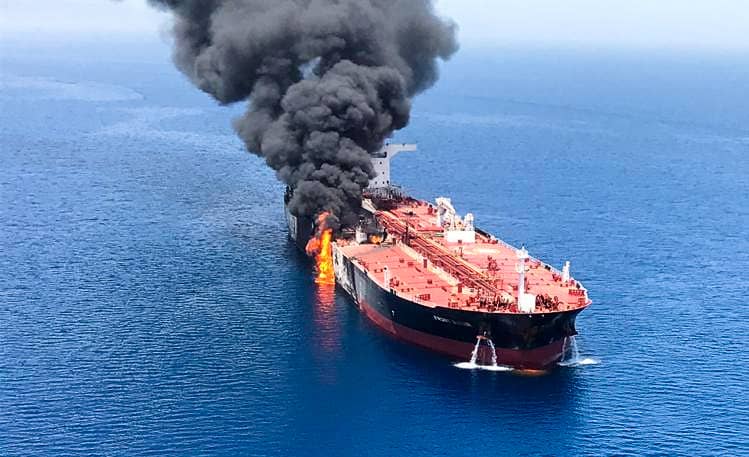Oil tanker attacks in the Strait of Hormuz requires an 'international response,' US envoy says

The international community must do more to ensure maritime security in the world's busiest transit lane for seaborne oil shipments, according to the U.S. special representative to Iran.
Six oil tankers and a U.S. spy drone have been attacked since May either in, or near, the Strait of Hormuz. The flurry of attacks has escalated tensions between the U.S. and Iran.
"Iran has been engaging in these attacks that affect many countries around the world. This is not limited to the United States, Saudi and the UAE. I think what is required is an international response," U.S. envoy to Iran Brian Hook told CNBC's Hadley Gamble in Abu Dhabi on Saturday.
"So much of the oil that goes through the Strait of Hormuz finds its way to Asia and so it is not just the region that is a stakeholder," Hook said.
The Strait of Hormuz, a narrow channel situated between the borders of Iran and Oman, accounts for approximately 30% of the world's seaborne oil traffic. It is seen as one of the most important waterways in the world, linking crude producers in the Middle East with key markets in the rest of the world.
'Burden sharing' with China
On being asked whether the United States will be open to countries like China participating in the Persian Gulf, Hook said it is for the president and secretary of state to make.
"We will get into that discussion. The G20 is coming up so that's a good forum for leaders to talk about maritime security and freedom of navigation. That's a very important principle that countries need to support, not only in words but also in deed," Hook said.
Attacks on two oil tankers in the Gulf of Oman last week and on four tankers off the United Arab Emirates in mid-May, both near the Strait of Hormuz, has ratcheted up concern about the prospect of a military confrontation.
Washington blames Iran for the attacks and almost launched a retaliatory strike on Thursday. Iran has denied it had been behind the naval attacks but said it downed the unmanned American drone after it had violated Iranian airspace.
The U.S. claims the drone was operating over international waters.
"We think that there is an opportunity for countries to play a role contributing to maritime security so that we can deter any future attacks by Iran on oil tankers," Hook said.
Hook further added that burden sharing is very important to President Trump.
"The key thing is that we know countries in Asia rely on freedom of navigation in the Strait, in the Gulf of Oman, in the Persian Gulf, in the Strait of Hormuz and so when Iran is conducting attacks on oil tankers in the region, it affects not just Fujairah, it affects much of the world, especially as we see on the oil prices. So we think a lot of countries will have interest in freedom of navigation and we will be talking to them about it, " Hook said.
Tensions have spiked between the U.S. and Iran since President Donald Trump's administration withdrew from the 2015 nuclear deal and reinstated sweeping sanctions on the Islamic Republic.
A.P. Moller-Maersk, the world's largest shipping firm, said Thursday that it had changed the route its ships sail through the Strait of Hormuz, citing safety concerns amid a series of rapid escalations between the U.S. and Iran.
Read More
No comments